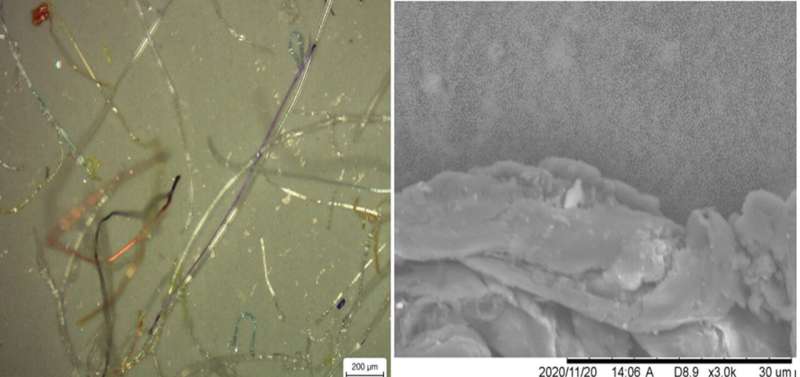
Swansea University scientists have uncovered potentially dangerous chemical pollutants that are released from disposable face masks when submerged in water.
The research reveals high levels of pollutants, including lead, antimony, and copper, within the silicon-based and plastic fibres of common disposable face masks.
The work is supported by the Institute for Innovative Materials, Processing and Numerical Technologies (IMPACT) and the SPECIFIC Innovation & Knowledge Centre.
Project lead Dr. Sarper Sarp of Swansea University College of Engineering said:
“All of us need to keep wearing masks as they are essential in ending the pandemic. But we also urgently need more research and regulation on mask production, so we can reduce any risks to the environment and human health”.
Outlined in a recent paper, the tests carried out by the research team used a variety of masks—from standard plain face masks to novelty and festive masks for children with many currently being sold in UK retail outlets.
The rise in single-use masks, and the associated waste, due to the COVID-19 pandemic has been documented as a new cause of pollution. The study aimed to explore this direct link—with investigations to identify the level of toxic substances present.
The findings reveal significant levels of pollutants in all the masks tested—with micro/nano particles and heavy metals released into the water during all tests. Researchers conclude this will have a substantial environmental impact and, in addition, raise the question of the potential damage to public health—warning that repeated exposure could be hazardous as the substances found have known links to cell death, genotoxicity and cancer formation.
To combat this, the team advise further research and subsequent regulations be put in place in the manufacturing and testing process.
Dr. Sarper Sarp continued:
“The production of disposable plastic face masks (DPFs) in China alone has reached approximately 200 million a day, in a global effort to tackle the spread of the new SARS-CoV-2 virus. However, improper and unregulated disposal of these DPFs is a plastic pollution problem we are already facing and will only continue to intensify.
There is a concerning amount of evidence that suggests that DPFs waste can potentially have a substantial environmental impact by releasing pollutants simply by exposing them to water. Many of the toxic pollutants found in our research have bio-accumulative properties when released into the environment and our findings show that DPFs could be one of the main sources of these environmental contaminants during and after the COVID-19 pandemic.
It is, therefore, imperative that stricter regulations need to be enforced during manufacturing and disposal/recycling of DPFs to minimise the environmental impact.
There is also a need to understand the impact of such particle leaching on public health. One of the main concerns with these particles is that they were easily detached from face masks and leached into the water with no agitation, which suggests that these particles are mechanically unstable and readily available to be detached.
Source: Read Full Article